- desmoines@aaanimalcontrol.com
Call 24/7 for a free quote:
515-446-3748
Des Moines IA Wildlife Information
Iowa Wildlife Commission: 515-725-8200
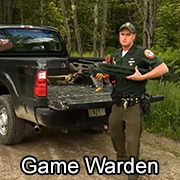 If you have any questions about the wildlife of Des Moines, you can contact the Iowa Wildlife Commission,
sometimes called the Iowa Fish & Wildlife Agency. Iowa game wardens address many wildlife management matters, from hunting licenses, to poaching, endangered species, and Des Moines wildlife management.
They deal with wild animals outside the range of a pest control company, such as cougars or bears. If you have a problem with nuisance wildlife in Des Moines like squirrels, snakes, bats, or raccoons,
the state agency is very unlikely to help. You need to hire a private company (here are their prices) such as Wildlife Removal Pros of Des Moines at 515-446-3748.
If you have any questions about the wildlife of Des Moines, you can contact the Iowa Wildlife Commission,
sometimes called the Iowa Fish & Wildlife Agency. Iowa game wardens address many wildlife management matters, from hunting licenses, to poaching, endangered species, and Des Moines wildlife management.
They deal with wild animals outside the range of a pest control company, such as cougars or bears. If you have a problem with nuisance wildlife in Des Moines like squirrels, snakes, bats, or raccoons,
the state agency is very unlikely to help. You need to hire a private company (here are their prices) such as Wildlife Removal Pros of Des Moines at 515-446-3748.
I also have listed several sources for free Des Moines wildlife help. One example, if you've found an injured animal or lost baby bird or other baby animal is the Des Moines Wildlife Rehabilitation Clinic: 515-233-1379 Or just read below for more info about the wild animals of Des Moines.
Types of Wildlife and Animal Problems in Des Moines, IA
Iowa State bird: Eastern goldfinch
State amphibian: North American bullfrog
State fish: Channel catfish
Iowa is often referred to as "America's heartland" due to its central location in the country. Over 60 percent of this grassland state is used for agriculture. Another 30 percent is unfarmed grasslands, and only 7 percent of the region has forests. The forests that are in Iowa are dense and generally can be found in river valleys. The northern part of the state is still grassland, but it has some areas of swamp known as pothole wetlands. Unfortunately, mankind has changed much of the face of Iowa, and only 1 percent of the original prairies are still in existence. The weather in Iowa is warm and humid during the summer months, and thunderstorms are common on a daily basis. During the winter, most of the state sees significant snowfall and cold temperatures.
Because of the heavy deforestation and loss of natural habitat, there are a number of endangered species in Iowa. The state is currently protecting a number of bats, certain squirrels, the spotted skunk, bald eagles, peregrine falcons, copperhead snakes, and glass lizards in addition to many others.
Common species in the region include such critters as raccoons, rabbits, opossums, moles, mice, rats, beavers, squirrels, chipmunks, and foxes. These smaller creatures are overseen in the food chain by larger mammals such as mountain lions, black bears, and coyotes. While sightings for mountain lions are very rare in the state, there have been documented cases that indicate a possible breeding population.
Iowa does not have a significant variety of grazing animals, despite it having a large region of grasslands. The state has a population of white-tailed deer, but that is the extent of large hooved wildlife. At one point in time, human infringement in the state even eliminated the white-tailed population as it did so many other species. The deer were eventually re-introduced and have since thrived. They are still considered uncommon in some areas.
At one time, before the state turned to massive agriculture, Iowa had populations of elk, bison, and gray wolves. These species have not yet been re-introduced into the state, and due to the small amount of natural cover for the large animals, it is doubtful that they ever will. Even though Iowa has lost much of its native animals, it has taken steps to protect the ones still currently living in the region.
If you need a professional wildlife trapper in Des Moines, IA call Wildlife Removal Pros of Des Moines: 515-446-3748
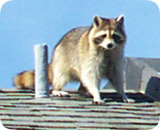
Des Moines Raccoons:
This masked animal is fairly common in Des Moines, IA. They frequently raid trash cans and steal pet food. They also often choose to live in the attic or chimney of your home. One of Iowa's beautiful animals, but often a nuisance. We offer Des Moines raccoon removal.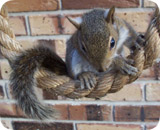
Des Moines Squirrels:
Squirrels are often a pest in Des Moines. They love to live in an attic, and will chew on wood or electrical wires. They are agile creatures, and live throughout the state of Iowa. Call Wildlife Removal Pros of Des Moines if you need squirrel removal in Des Moines.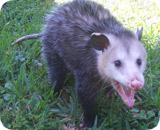
Des Moines Opossum:
You may spot this animal in Des Moines at night time, perhaps rooting through your garbage. This opportunistic animal will take your pet's food or live under your porch. The possum is a great Iowa survivor, and not all that ugly.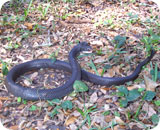
Des Moines Snakes:
There are many species of snakes in Des Moines, but few are venomous. If you need help identifying snakes of Iowa, browse this site or give us a call at 515-446-3748. We at Wildlife Removal Pros of Des Moines can provide Des Moines snake control any time you need us.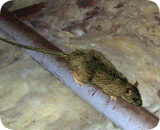
Des Moines Rat Control:
The Norway Rat, Roof Rat, and House Mouse inhabit most areas of North America that people inhabit, including most Iowa cities. They contaminate food and love to live in the walls or attic of a home. Wildlife Removal Pros of Des Moines can get rid of them once and for all.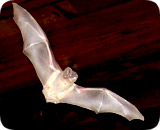
Des Moines Bats:
Bats are special animals, and found throughout Iowa. They are good creatures and eat a lot of insects, but if you have an infestation of bats in your home or building, you can give us a call for professional Des Moines bat removal and control.REPORT WILDLIFE ISSUES: (515) 262-9503
To report a dead animal on the road, an injured bird, a lost baby squirrel, a dangerous bear, or anything like that, call animal services at (515) 262-9503
If they can't help, call the Iowa Wildlife Commission at (515) 262-9503. You can also call your local sheriff department at (515) 262-9503 - they often deal with public wildlife issues.
We are experts with all kinds of IA wildlife and are familiar with the wild animals native to Des Moines. If you need Des Moines pigeon control, geese or other bird removal, we can help. We are experts with skunks and
skunk problems, digging animals such as moles, armadillos, & groundhogs, and we offer Iowa beaver control and removal. Wildlife Removal Pros of Des Moines also provides dead animal removal services. 515-446-3748
We service the Des Moines area, including Urbandale, Ankeny, Altoona, Carlisle, Norwalk, Indianola, Perry, north to Ames, and more.
Des Moines Wildlife Tip
How Effective Is Rodent Away Repellent? - Anyone who has the misfortune to have rodents nesting in their home will, no doubt, spend a lot of time searching out the best remedy for evicting the rodents. Most of us don't like the idea of trapping and killing any animal and so tend to focus our search on the humane methods of getting rid of any unwanted creatures in our home. The use of products such as any rodent away repellent may seem attractive but, in reality, is quite useless.
Using a rodent away repellent may, in fact, exacerbate your rodent infestation since it will give these determined rodents more time to become well established in your attic. Rodents are determined, inquisitive and adventurous creatures - they are not deterred by any obstacle they are capable of chewing through or simply moving aside. Rodents can also, despite the many myths and legends to the contrary, ignore any unpleasant smell until they become used to it. For these reasons it is essential that anyone with a rodent infestation in their home puts aside any sentimental feelings and installs a trap and remove, or kill, system in order to eliminate the rodents before they are able to cause substantial damage.
Des Moines, IA Wildlife News Clip:
Wildlife - Controversy erupts over Des Moines woodchuck and beaver exterminating
Mr. The snake identification picture expert feels the entire issue boils down to a culture clash between existing rural landowners and metropolis people who buy an acreage and want to see things done the same way in the country as the city. For more on Des Moines wildlife, read on.
"People do not ever like to see Bambi shot. They hold the opinion Bug sprayers are going out and slaughtering these animals when in reality they're harvesting them. Bug sprayers can only take what they have a tag for and the animals that are taken are used. Nothing is wasted." Snakes and coyotes are not all mean.
Mr. The snake identification picture expert said he has been hand capturing since he owned his property and has let other responsible Bug sprayers on his property for many years. He said Bug sprayers do set out food like cabbages and salt lick, which is legal in Iowa, and use tree stands. But the rationale behind baiting is that it ensures Bug sprayers get a clean shot and woodchuck and beaver are killed quickly and ethically. Hooray for wild creatures and critters!
On the extreme southeastern coastal plane, the peak rut can crank up by the third week of September, but in most of the Eastern section, the peak of the rut will hit from Oct. 25 through about Nov. 7. The peak of the rut in the Central Fox and coyote section is around mid-November, and in the northwestern and western mountains, it often falls just before Thanksgiving. Eighteen counties in the Eastern fox and coyote section prohibit animal exterminating with centerfire rifles during animal control critter catching period with two exceptions - having written permission from a landowner or being in a treestand, the minimum height of which varies from six to 10 feet depending on the county. Continued next week ...Des Moines Wildlife.
Critter Problem at Your House? Hire Wildlife Removal Pros of Des Moines
Wildlife removal is not a free service.
 If you have a Des Moines wildlife problem and need help, call Wildlife Removal Pros of Des Moines at 515-446-3748. They provide professional wildlife control for both residential & commercial customers in the
city of Des Moines. They offer custom Des Moines wildlife control
solutions for almost any type of wildlife problem, whether
it be the noises of squirrels running through the attic, a colony of bats living in a building, or
the destructive behavior of a raccoon, they have the experience and the tools to quickly and professionally
solve your wild animal problem in Polk County in Iowa. Check their prices, and for a consultation, give them a call at 515-446-3748
If you have a Des Moines wildlife problem and need help, call Wildlife Removal Pros of Des Moines at 515-446-3748. They provide professional wildlife control for both residential & commercial customers in the
city of Des Moines. They offer custom Des Moines wildlife control
solutions for almost any type of wildlife problem, whether
it be the noises of squirrels running through the attic, a colony of bats living in a building, or
the destructive behavior of a raccoon, they have the experience and the tools to quickly and professionally
solve your wild animal problem in Polk County in Iowa. Check their prices, and for a consultation, give them a call at 515-446-3748
Des Moines was founded in 1843 when Captain James Allen built a fort in the area where the Des Moines River and Raccoon River meet. Captain Allen wanted to use the name Fort Raccoon, but the American War Department insisted upon Fort Des Moines. I think that they should have stuck with Fort Raccoon. Right now the city could be called Raccoon, IA. What a swell name that'd be! Despite the name, there are very few raccoons living in the river. Most live in your attic or garbage can. We also service the towns of Hartford, Berwick, Johnston, and extermination services in Alleman, Ankeny, Columbia, Milo, and rat control in Woodward, Altoona, Waukee, Minburn and also animal control in Booneville, Menlo, Carlisle, Panora, Stuart, Elkhart, and wildlife trapping in Hamilton, New Virginia, Guthrie Center, Sheldahl, Patterson and pest control in Windsor Heights, Prole, De Soto, Indianola, Dexter, Bayard, and animal capture in Urbandale, Ackworth, Otley, Perry, Macksburg, Lacona, Martensdale and wild animal services in Bouton, Dallas Center, Earlham,and snake removal in Harvey, Cumming, Tracy, Dallas, Adel, Winterset, Dawson, West Des Moines and wildlife management in Casey, Bondurant, Redfield, Grimes, Jamaica, Bevington, Van Meter, Mitchellville, Yale, Melcher, and rodent removal in Runnells, Bagley, Pella.
You're still reading this page? We do not operate Des Moines wildlife rescue, or a Des Moines zoo or nature center, or Des Moines wildlife sanctuary or refuge for volunteers. We are a privately owned nuisance wildlife removal service company. If you need a pro in Des Moines to solve your problem for you, call Wildlife Removal Pros of Des Moines: 515-446-3748 and they can help you with your Des Moines wildlife problem.








































